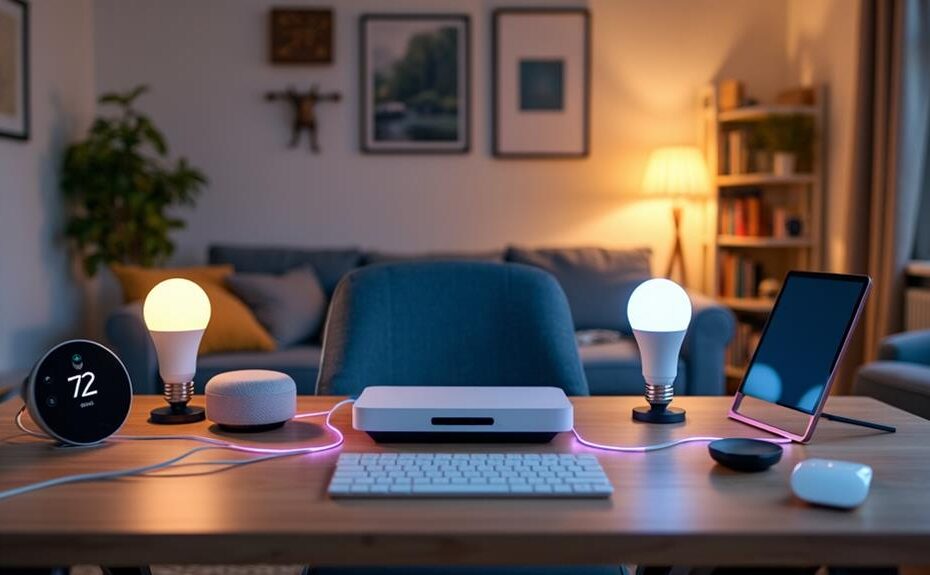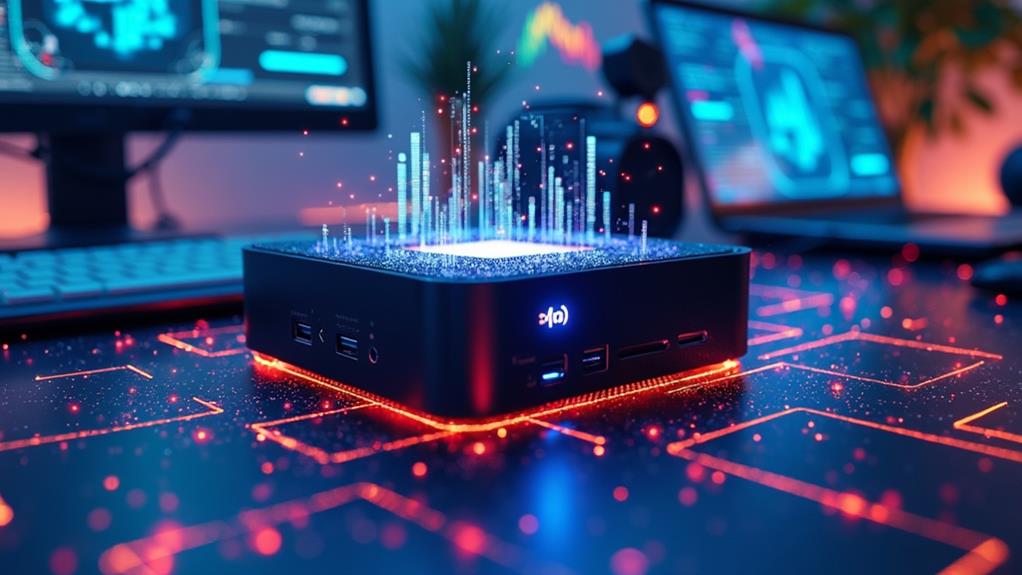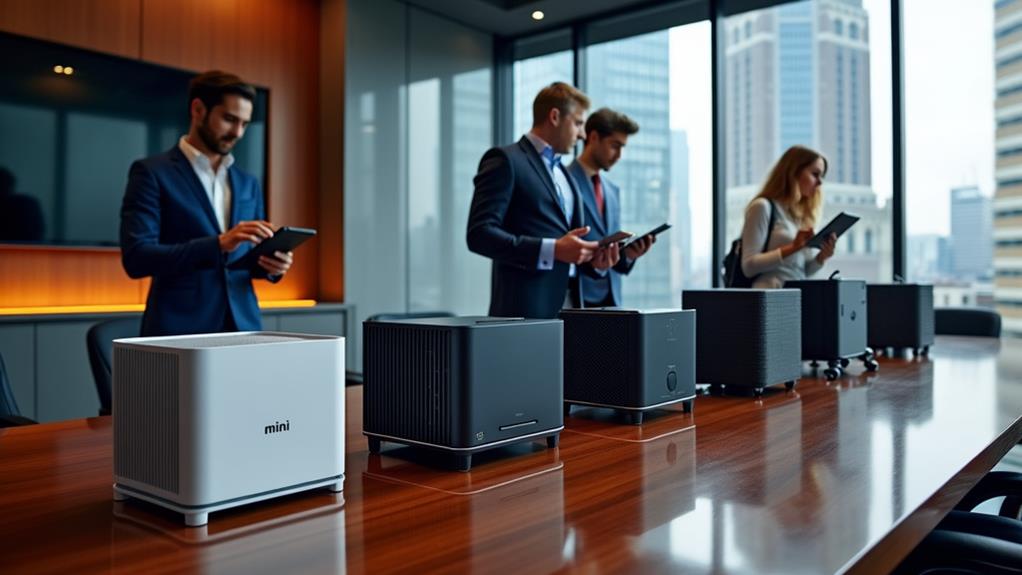



Mini PCs integrate with smart home technologies by acting as central hubs that connect and manage your various devices. They support multiple connectivity options like Zigbee, Bluetooth, and Wi-Fi, which guarantees seamless communication between your gadgets. With their powerful processing capabilities, mini PCs run automation software such as Home Assistant, allowing you to create custom routines for enhanced efficiency. Their compact design and low power consumption enable discreet, continuous operation. By serving as a unified controller for your smart ecosystem, mini PCs help streamline your home management. Discovering their full potential can release even more possibilities for your smart home experience.
Key Takeaways
- Mini PCs serve as central hubs, managing various smart devices through compatible software like Home Assistant or openHAB.
- They support multiple connectivity options, including Zigbee, Bluetooth, and Wi-Fi, facilitating seamless communication with various smart home devices.
- Powerful processing capabilities allow Mini PCs to handle extensive automation tasks and real-time data processing for efficient smart home management.
- Compact design and low power consumption enable unobtrusive, continuous operation, making them ideal for residential environments.
- Advanced automation features allow users to create customized routines and scripts, enhancing overall smart home convenience and efficiency.
Overview of Mini PCs
As you explore the world of smart home technologies, you'll find that mini PCs, like the DSGW-290, play an essential role in creating efficient and compact setups. These devices are designed with a small form factor, making them perfect for discreet placement in your living spaces without overwhelming your decor. Their low power consumption means you can run them continuously without worrying about a spike in your energy bills. Additionally, their robust features support remote monitoring applications, which can enhance the functionality of your smart home. Mini PCs excel in their ability to connect seamlessly with smart devices through versatile options like Zigbee, Bluetooth, and Wi-Fi. This connectivity allows you to control your smart home effortlessly, whether it's adjusting the thermostat or managing your lighting. By running automation software like Home Assistant or openHAB, these mini PCs act as centralized hubs, integrating various smart technologies into one cohesive system.
Moreover, the high-performance processing capabilities of mini PCs enable real-time data processing, allowing for advanced automation routines that enhance your smart home functionality. With their quiet operation and compact size, mini PCs are an ideal choice for anyone looking to streamline their smart home setup while maintaining efficiency and performance.
Benefits of Integration
Integrating mini PCs into your smart home setup offers a multitude of benefits that enhance both functionality and user experience. One of the most significant advantages is their ability to streamline media consumption. By combining multiple sources, such as streaming services and local content, into a single device, you can easily control your entertainment options with minimal hassle. Additionally, their balanced performance guarantees that applications run smoothly, enhancing the overall experience.
Mini PCs also serve as a central hub for managing various IoT applications, allowing for seamless integration across different platforms within your smart home ecosystem. Their compact size and low power consumption make them ideal for running home automation software like Home Assistant, providing unobtrusive continuous operation.
With advanced connectivity options like HDMI, USB, and wireless capabilities, mini PCs facilitate effortless communication with smart TVs and other devices, guaranteeing a cohesive experience. Furthermore, the power of mini PCs supports high-resolution video output and customizable settings, elevating your viewing experience. From entertainment to productivity tasks, they allow you to enjoy everything from the comfort of your living spaces, making them invaluable in modern smart home setups.
Key Features of Mini PCs
Mini PCs are packed with features that make them standout components in smart home ecosystems. Mini PCs typically offer versatile connectivity options like Zigbee, Bluetooth, Wi-Fi, and Ethernet, ensuring seamless integration with various smart home devices. Their compact size and impressive energy efficiency mean they can run continuously without greatly impacting your energy bills. For instance, the PELADN WI-6 Mini PC, with its multiple connectivity options, showcases how mini PCs can facilitate interactions with a variety of devices.
One of the key advantages of mini PCs is their support for multiple operating systems. This flexibility allows you to run home automation software such as Home Assistant or openHAB, providing centralized control over your smart devices. With impressive processing power and ample RAM, mini PCs can effectively manage extensive automation tasks and real-time data processing, which is vital for IoT projects.
Furthermore, mini PCs serve as central hubs, facilitating communication between diverse smart home devices. This capability enhances user interaction and streamlines digital content management, making your smart home experience more cohesive and efficient. Whether you're looking to optimize your automation system or improve device communication, mini PCs are an invaluable asset in achieving an integrated smart home environment.
Setup and Configuration
Setting up a mini PC in your smart home can be a straightforward process that greatly enhances your device management capabilities. First, connect your mini PC to your smart TV or network using HDMI, USB, or Ethernet cables. This seamless integration allows for effective communication between the mini PC and your smart home ecosystem.
During the configuration phase, installing compatible software like Home Assistant or openHAB is essential for achieving centralized control over your devices. This software enables you to personalize settings and automate routines effortlessly, making your smart home experience more efficient.
When it comes to network connectivity, consider using Ethernet for stability or dual-band Wi-Fi for flexibility. This choice guarantees your mini PC operates efficiently within your smart home network, reducing potential disruptions.
The compact size and low power consumption of mini PCs also allow for discreet placement in your living space while managing devices continuously. By carefully setting up and configuring your mini PC, you create a powerful hub that streamlines the management of your smart home, making everyday tasks simpler and more automated.
Enhancing Smart Home Experience
A mini PC's role in your smart home can greatly elevate how you interact with your devices. Serving as a central hub, it streamlines control and automation of various smart home devices through platforms like Home Assistant or openHAB. This integration allows you to manage your IoT ecosystem efficiently, enhancing the overall functionality of your smart home.
With its low power consumption and compact size, a mini PC can run 24/7 without taking up much space, providing reliable support for your smart home functionalities. Its versatile connectivity options, including Zigbee, Bluetooth, and Wi-Fi, guarantee seamless integration with a wide range of devices, making it an excellent choice for any smart home setup.
Moreover, using a mini PC enhances your experience by enabling advanced automation features. You can create customized routines and scripts that allow for smarter operation of connected devices, adapting to your lifestyle. Additionally, running on Linux-based operating systems, mini PCs support various smart home protocols, guaranteeing compatibility with numerous brands and devices. This cohesive connectivity simplifies your smart home management, making your life easier and more enjoyable.
Use Cases in Smart Homes
Leveraging a mini PC in your smart home opens up a world of innovative use cases that enhance both convenience and efficiency. As a central hub, the mini PC enables you to control various devices and appliances—like lights, thermostats, and security systems—through platforms such as Home Assistant or openHAB. Its low power consumption means you can keep it running continuously without worrying about energy bills or space constraints, making it a perfect fit for discreet home automation solutions.
With powerful processing capabilities, your mini PC can handle multiple tasks simultaneously, allowing real-time data processing for smart devices and automating daily routines. Imagine controlling your home's lighting or climate effortlessly, or activating security systems with a simple voice command. The diverse connectivity options, including Zigbee, Z-Wave, and Wi-Fi, guarantee compatibility with a wide range of smart home devices, enhancing integration.
Moreover, the programmability of mini PCs lets you customize your home automation experience. You can create tailored scripts and automations, guaranteeing your smart home functions exactly how you want it to. Overall, mini PCs are transforming the smart home landscape, making it more efficient and user-friendly.
Selecting the Right Mini PC
Choosing the right mini PC for your smart home can greatly impact your automation experience. First, you'll want to verify compatibility with your smart devices, so check for connection options like HDMI, USB, and wireless casting. Aim for a mini PC that features an Intel Core i5 CPU, at least 8 GB of RAM, and a solid-state drive. These specifications are vital for the seamless operation of your smart home applications.
Next, consider the size and noise level of the mini PC. You'll want something discreet that fits into your living space without being intrusive. Additionally, the ability to support various operating systems is essential. Linux-based options such as Ubuntu Server are popular choices for running smart home automation software like Home Assistant.
Don't overlook networking capabilities, either. A mini PC with dual-band Wi-Fi or Ethernet connectivity will guarantee reliable communication with your smart devices. By selecting a mini PC customized to meet these criteria, you'll set the foundation for a robust smart home integration that enhances your daily life. Make informed choices, and enjoy the benefits of an automated home.
Future of Smart Home Integration
As you explore the future of smart home integration, the role of mini PCs becomes increasingly significant. Their compact size and energy efficiency make them ideal candidates for serving as central hubs that seamlessly manage a variety of smart devices and IoT ecosystems. With advancements in edge computing, mini PCs will facilitate real-time processing, allowing for quicker decision-making and responsiveness in your smart home.
The enhanced programmability of mini PCs empowers you to customize your smart home experience. Whether you prefer different operating systems or programming languages, these devices will enable tailored automation solutions that fit your specific needs. Additionally, the integration of artificial intelligence and machine learning into mini PCs will lead to smarter automation and predictive analytics, creating a more intuitive, adaptive environment.
As smart home technologies continue to evolve, mini PCs are set to become cost-effective and scalable solutions for both residential and small-to-medium-sized business applications. You'll find that their capabilities will allow for the deployment of sophisticated IoT infrastructures without the overhead of traditional servers, making your future smart home integration not only smarter but also more accessible.
Conclusion on Mini PC Impact
The impact of mini PCs on smart home technologies can't be overstated. By serving as central hubs, mini PCs empower you to control and manage various connected devices through a single, user-friendly interface. Their ability to support multiple ecosystems means you can seamlessly integrate with platforms like Amazon Alexa, Google Assistant, and Apple HomeKit, enhancing your overall user experience.
Moreover, mini PCs are particularly appealing due to their low power consumption and compact size, making them ideal for continuous operation in your living space. This unobtrusive nature allows you to maintain a sleek aesthetic while still enjoying the full benefits of smart home automation.
Advanced connectivity options, such as Zigbee, Z-Wave, and dual-band Wi-Fi, guarantee that your mini PC can communicate effectively with a wide range of smart devices, providing you with the versatility needed to customize your smart home experience. Additionally, the programmability of mini PCs allows you to run automation software like Home Assistant, enabling further customization tailored to your needs. Overall, mini PCs greatly enhance the integration and functionality of smart home technologies, making them a vital component of modern automation.
Disclosure: As an Amazon Associate, I earn from qualifying purchases.







